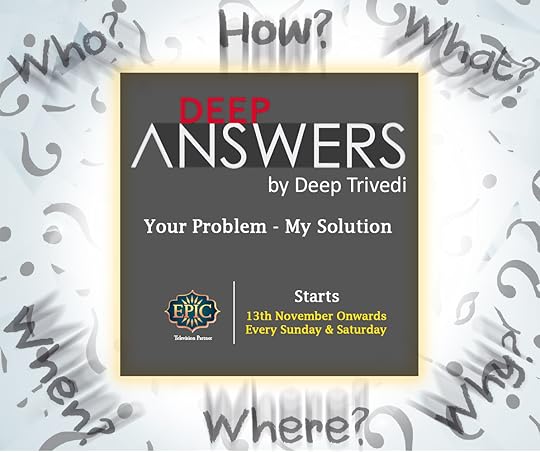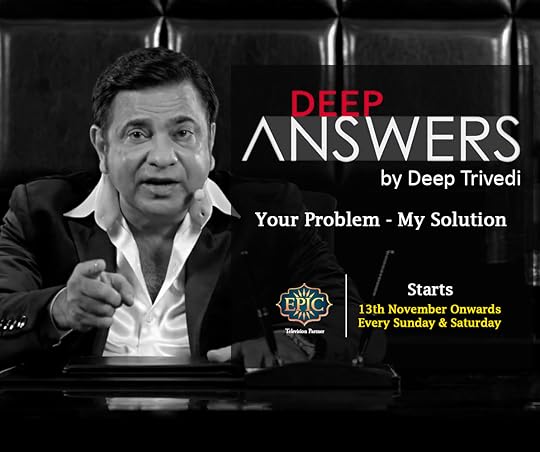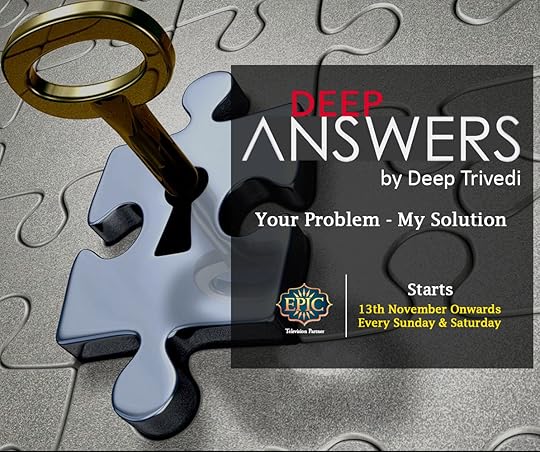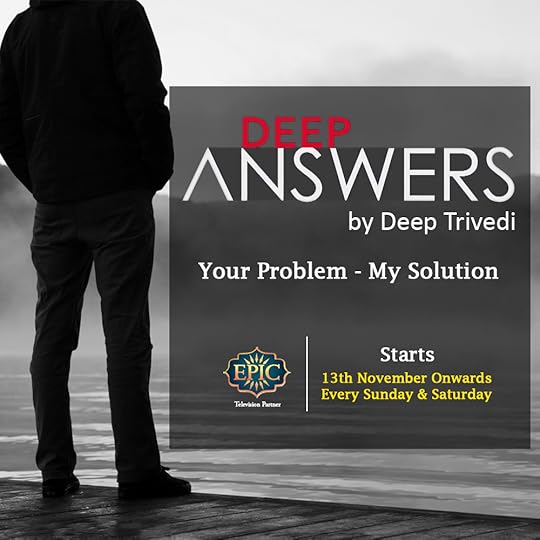Deep Trivedi's Blog, page 23
November 9, 2016
“Treating alike victory and defeat, gain and loss, pleasure and pain, Get ready for the battle. Fighting thus you will not incur sin.” – #BhagavadGita Shlok – (Chapter-2, Verse-38)

Meaning of the #Shlok
In this shloka, Krishna is stating a very high-level psychology. Arjuna, quoting the Vedas and scriptures is repeatedly telling Krishna, it is not just me who is saying so, even in all these scriptures it is written that killing your loved ones is a sin. On the other hand, Krishna is aware of the reality that by supporting himself with the scriptures, Arjuna actually wants to turn his back on the war; and this is not agreeable to Krishna. So, straight away expressing doubt over the scriptures itself, Krishna is telling Arjuna that if you want to speak the language of sin and virtue then listen very clearly, in reality, deeds are neither sinful nor pious. A deed is an act of the body, what does it have to do with sin or virtue? For sin-virtue are matters of the mind. So, if you don’t want to commit a sin really, then from your mind itself, forsake these ideas of victory-defeat and gain-loss that you’re thinking of. My dear! If you are fearful of committing a sin, then stop asking that what is the advantage or disadvantage of fighting a battle? And definitely don’t say that oh! Keshav – who is likely to emerge victorious in this battle? Whoever may benefit or whoever may be at a loss, whosoever wins or loses, how are you concerned with it? With your victory or escaping death, will the battle become pure?
Oh Arjuna, don’t try to confound me! Don’t shield your fears and attachments behind scriptures. If you want to be saved from sin then there is only one way out for you, that you consider the victory-defeat and gain-loss happening in the war as equal. Whatever may be the result of the war, let it be; you accept it wholeheartedly as Nature’s justice. It’s best for you to fight the war being least concerned of its result. I promise you in that case you shall not incur any sin. Oh dear, this is not only with respect to fighting in the battle… Whatever you do in life without caring about the result, I promise you that you will never incur any sin. But also remember that even if you do the greatest of the deeds by calculating victory-defeat and gain-loss, in the end you will incur sin. And I don’t need to tell you that from every sin only sorrow manifests. And you don’t need to look far for proof; just take a look at your present condition. This sorry state in which you are, is also because instead of fighting in the battle you are busy doing the math of gain-loss. And because you are perceiving loss in the current battle is why you are unhappy! If you would be seeing it as profitable, you would not even seek my knowledge or the scriptures’ wisdom, you would have attacked the Kauravas with gusto by now! Hence, the prime fact among all the arguments is only this – the calculation of gain-loss that is influencing your decision is itself sin.
– Deep Trivedi
Watch #DeepTalks by Deep Trivedi on The EPIC Channel from November 13, 2016 onwards
Share PostTwitterFacebookGoogle +1Email
Are you looking out for Answers? Watch out for our new programme – DeepAnswers by Deep Trivedi
November 8, 2016
“As a man shedding worn-out garments, takes other new ones, likewise the embodied soul, casting off worn-out bodies, enters into others that are new.” – #BhagavadGita Shlok – (Chapter-2, Verse-22)

Meaning of the #Shlok
Krishna, in an attempt to do away with the fear overshadowing Arjun, is explaining to him the true form of soul. And so he says that this soul, because of which breathing is possible, is immortal. Like you change out of your night clothes in the morning but it doesn’t affect your body in the least, exactly the same way the soul gives up the old body and dons a new one. And taking on this new body also doesn’t have any effect on it
– Deep Trivedi
Watch #DeepTalks by Deep Trivedi on The EPIC Channel from November 13, 2016 onwards
Share PostTwitterFacebookGoogle +1Email
Are you looking out for Answers? Watch out for our new programme – DeepAnswers by Deep Trivedi
November 7, 2016
“Arjuna, the man who knows this soul to be imperishable; eternal and free from birth and decay–how and whom will he cause to be killed, how and whom will he kill?”- #BhagavadGita Shlok – (Chapter-2, Verse-21)
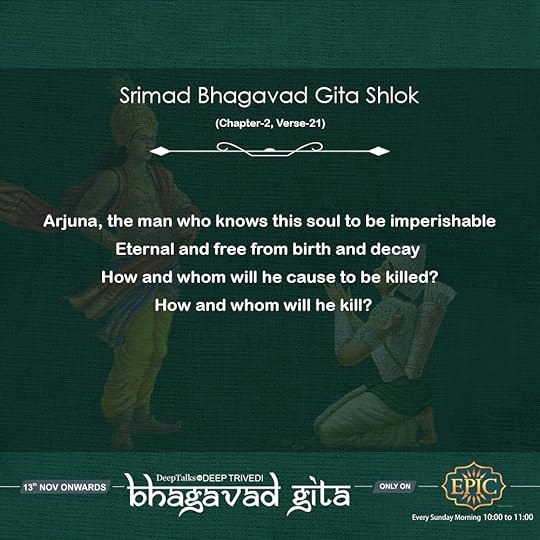
Meaning of the #Shlok
In this verse, an astounded Krishna is firmly asking Arjuna that Oh son of Pritha! a man like me who believes the soul is indestructible, everlasting, unborn and invariable, how is it possible that he can get someone killed, and how can he feel that he is dead. If you don’t believe in yourself, then at least keep faith in your wise friend. If really someone was to die or any damage was to be inflicted… then would I have been standing in this battlefield?
– Deep Trivedi
Watch #DeepTalks by Deep Trivedi on The EPIC Channel from November 13, 2016 onwards
Share PostTwitterFacebookGoogle +1Email
Are you looking out for Answers? Watch out for our new programme – DeepAnswers by Deep Trivedi
November 6, 2016
“Both of them are ignorant, he who considers the soul to be capable of killing and he who takes it as killed; for verily the soul neither kills, nor is killed.” – #BhagavadGita Shlok – (Chapter-2, Verse-19)
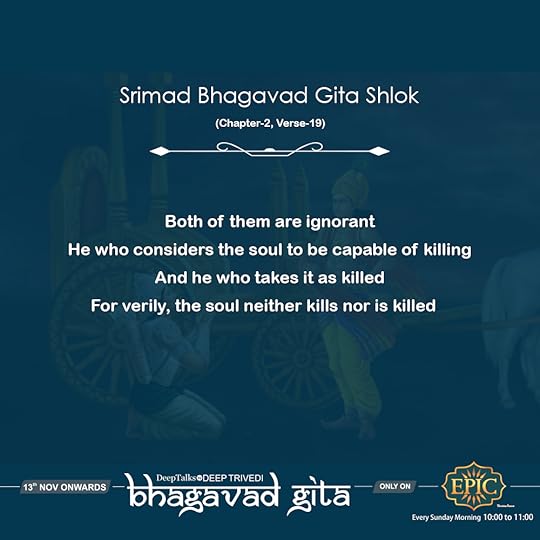
Meaning of the #Shlok
In this verse, Krishna is telling Arjuna who is grieving the probable deaths of everyone, that you and the ones you are grieving for, are all neither mind, brain nor body, but in fact souls. And because this soul is of the nature to remain unchangeable, therefore neither does it kill anyone nor does it itself die. Hence, this belief of yours that many people will die at your hands or that you yourself will die at someone’s hands is nothing but your misconception.
– Deep Trivedi
Watch #DeepTalks by Deep Trivedi on The EPIC Channel from November 13, 2016 onwards
Share PostTwitterFacebookGoogle +1Email
Are you looking out for Answers? Watch out for our new programme – DeepAnswers by Deep Trivedi
November 5, 2016
“Arjuna, the wise man to whom pain and pleasure are alike, and who is not tormented by these contacts, becomes eligible for immortality.” – #BhagavadGita Shlok – (Chapter-2, Verse-15)

Meaning of the #Shlok
In this shloka, Krishna is telling Arjuna that whenever your mind-brain come in contact with any subject, happiness or sorrow is bound to manifest. And when happiness manifests then a human being feels elated, but when sorrow manifests he feels unhappy. But these are not the traits of an intelligent human being. A happy today – an unhappy tomorrow, peaceful mornings – sorrowful evenings, is this a way to lead your life? Meaning, an understanding, composed human being doesn’t differentiate between these transient joys and sorrows. When by any kind of confluence sorrow manifests, he believes it to be an external thing and even when happiness emerges, he distances himself from it. Because he knows: if I rejoice in happiness then when I will be faced by a contradicting situation I will become hassled for sure. What more…? It is better then, that no matter what happens on the outside, from within I don’t lose my composure. And he who doesn’t lose his inner composure at the slightest instance, will always find an emotional consistency maintained in his being. And Oh Arjuna! He who lives in such a state of constantness, believe me he is surely deserving of salvation. So Arjuna, it’s wrong to be influenced by external joys and sorrows.
– Deep Trivedi
Watch #DeepTalks by Deep Trivedi on The EPIC Channel from November 13, 2016 onwards
Share PostTwitterFacebookGoogle +1Email
November 4, 2016
“Oh son of Kunti, the contact between the senses and their objects, which give rise to the feelings of heat and cold, pleasure and pain are transitory and fleeting; therefore, Arjuna, endure them. ” – #BhagavadGita Shlok – (Chapter-2, Verse-14)

Meaning of the #Shlok
Seeing Arjuna’s sorrow Krishna is telling him that Oh son of Kunti! Why are you mourning so much? Why are you getting so disillusioned? This grief that you are feeling because of the battle’s outcome and its consequent deaths is not justified at all! Because beyond a human being’s comprehension numerous things are always in conflict and from that, owing to a human being’s own weakness, different types of emotions keep emerging in him; however these emotions are only transitory! Presently the thing that is hurting you will cease to be hurtful tomorrow. Oh Arjuna! You yourself analyse your experience. Until now your mind and intelligence have synthesised with numerous topics, and you have borne the many pleasures and pain emerging from it; but today is even one of them existent within you?
In the same manner, free yourself immediately from this sorrow that you are harbouring presently; because anyway tomorrow it is going to cease to exist within you.
– Deep Trivedi
Watch #DeepTalks by Deep Trivedi on The EPIC Channel from November 13, 2016 onwards
Share PostTwitterFacebookGoogle +1Email

